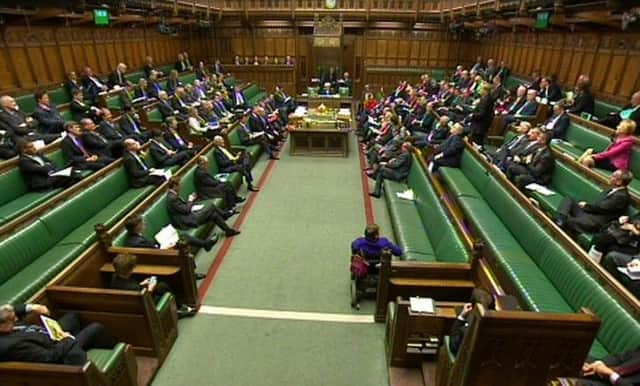Labour set to boycott EVEL talks


Ed Miliband’s party denounced the talks being led by Leader of the Commons William Hague as “a closed-shop stitch-up” when “proper reform” is needed.
But the Prime Minister rejected the suggestion that he was playing politics with the Union following a vow made to the people of Scotland during the referendum campaign.
Advertisement
Hide AdAdvertisement
Hide AdHe said: “What we need is obviously more devolution for Scotland but a settlement that’s fair for the whole of the United Kingdom.
“I think it’s a matter of great regret if Labour are going to walk out of this Cabinet committee which they could join and make their suggestions.
“But obviously they are not interested in fairness across the United Kingdom so we will have to work hard with other partners to make sure we deliver.”
The row blew up as MPs in the Commons debated the promise of more powers for Scotland, amid nationalist claims that Westminster politicians are “back-pedalling” on promises made ahead of last month’s independence referendum.
Mr Cameron angered Scottish nationalists on the morning after the failed independence vote, when he said that the implementation of further devolution north of the Border should go “in tandem” with moves to resolve the long-standing question of whether Scottish MPs should be allowed to vote on laws which affect only England or England and Wales.
He tasked Mr Hague with chairing a Cabinet committee to draw up a way forward, and the Commons Leader invited other parties to take part in discussions. But a Labour source has confirmed the party will not take part, saying: “We need proper reform, not a closed-shop stitch-up in a Cabinet room.”
Mr Miliband’s party has called for a swift transfer of powers to Edinburgh, along with the establishment of a constitutional convention to look at the wider issues raised by devolution.
Opening the debate in the Commons, Mr Hague indicated the government could be open to a convention, but not if it delayed immediate discussions and decisions.
Advertisement
Hide AdAdvertisement
Hide AdHe said: “The Labour Party can come to the Cabinet committee and put that forward – but they seem unwilling to do so. Indeed, the government will consider the proposals for the establishment of such a body on the right terms and at the right time. It’s my view there is merit in this.
“But no one is suggesting delay in the commitments we have made to Scotland in order to wait for a constitutional convention. No one is suggesting delay in the amendments we make to the Wales Bill.
“Equally, it is right to address the needs of England without delay in the coming months and that is why we propose to do so.” Mr Hague warned that “insensitivity and indifference” to concerns over the English votes issue risked the future of the United Kingdom.
“I know there are MPs who argue that to address this question is to somehow put the United Kingdom itself at risk but I say to them the United Kingdom is in greater danger if the legitimate arguments and expectations of English decision-making, on decisions affecting only England, are not responded to,” he said.
“Insensitivity and indifference is the danger to the Union in all nations including in England.”
Former prime minister Gordon Brown warned that the issue would destroy the United Kingdom. In a rare appearance in parliament, Mr Brown denounced the so-called EVEL (English votes for English laws) proposal combined with a Tory demand to devolve all income tax as a “lethal cocktail.”
Quoting Abraham Lincoln’s use of the Gospel of St Mark, he warned: “A house divided against itself cannot stand, a kingdom divided against itself is brought into desolation.”
He criticised Mr Cameron for raising the issue of English votes just minutes after the referendum result was declared and he warned that it would not only affect Scottish MPs.
Advertisement
Hide AdAdvertisement
Hide AdSNP leader Alex Salmond said Mr Cameron was already “reneging” on pledges made during the referendum campaign.
“The Prime Minister started the process of reneging when he came out of Downing Street hours after the referendum and said that progress in Scotland should be in tandem with constitutional change in England. Even Gordon Brown is finding it difficult to stomach.”
The First Minister also indicated that he did not view another referendum as completely off the agenda: “My view is that constitutional referendums come along once every political generation – about every 20 years or so.”
SEE ALSO